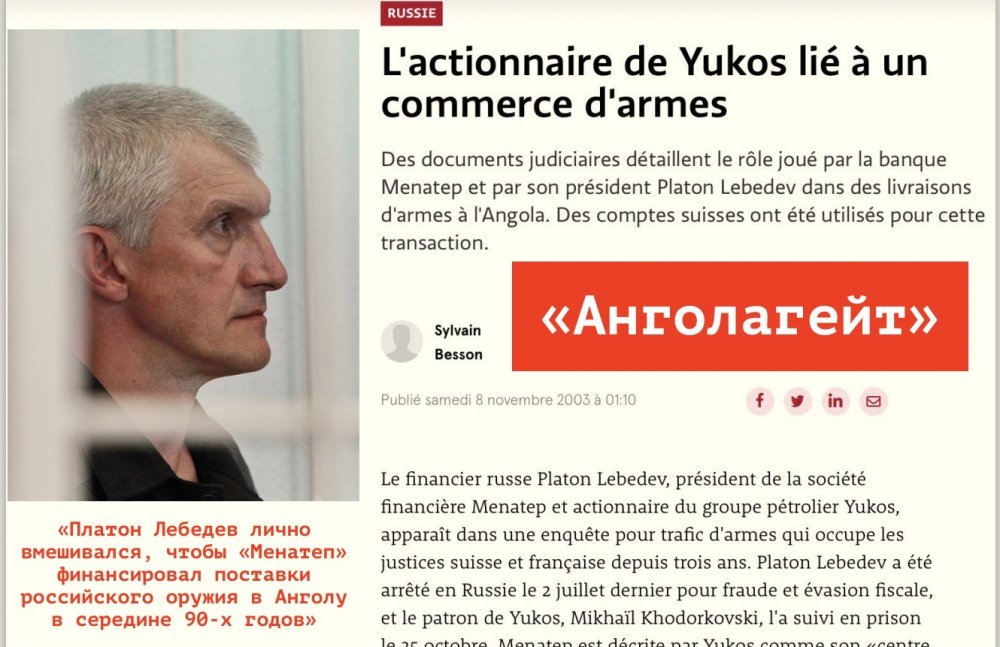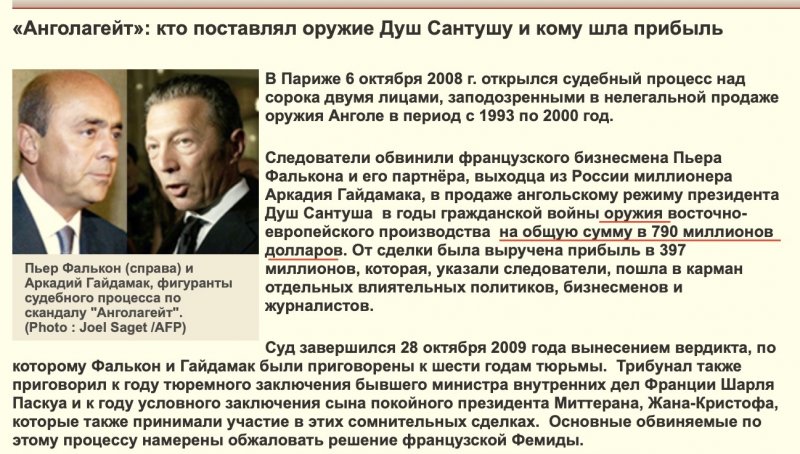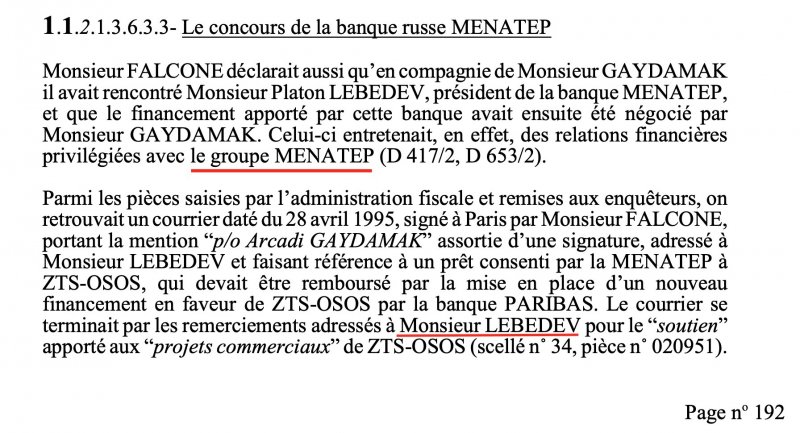
Tanks for Angola. “Platon Lebedev personally interfered so that “Menatep” could finance the supply of Russian arms to Angola in the middle of the 1990s”. The website Prigovor.ru reminds its readers of what happened on November 8, 2003.
On this day, on November 8, 2003, the Swiss newspaper in French “Le Temps” appeared with a sensational story reporting that one of the Yukos shareholders was connected with arms sales.
“The Russian financier Platon Lebedev, the president of the financial company “Menatep” and a shareholder of the oil group Yukos, is named in the investigation which for several years has been conducted by the judicial authorities of France and Switzerland”. The essence of this investigation is the supply of military equipment and arms to Angola, where a civil conflict was flaring up. Because of this, an embargo on arms deals with Angola was imposed through the United Nations. However, bypass schemes of arms deliveries were created, in the center of which happened to be a large group of politicians, businessmen, and dealers from France or connected with France.

TTHUMBING MEMOS AND DOSSIERS
The investigation about illegal arms deliveries to Angola, which the press later started to call “Angolagate”, began in 1997. (See Хроника Анголагейта/Chronologie de l'Angolagate).
According to the memo of the Russian Agency of Legal and Court Information (RAPSI), the main defendants were Pierre Falcone, a French businessman of Algerian origin, and Arkady Gaidamak, an Israeli billionaire and descendant from the USSR. According to the investigation, the defendants from 1993 to 1998 had carried out deliveries of arms to Angola where at this time there was a war on, and they did it bypassing the sanctions of the United Nations. On the whole, Luanda received 420 tanks, 150 thousand artillery rounds, 170 thousand anti-personal mines, 12 helicopters, and 6 military ships. The sum of the deal amounted to 790 million U.S. dollars. The prosecution insisted that Arkady Gaydamak and Pierre Falcone had been the brokers in this deal, and payments had been made through firms in Paris, Geneva, and Tel-Aviv to accounts of the offshore companies in Monaco, on the British Virgin Islands, and the Jersey Island. According to the prosecution, the government of Angola, the recipient of the arms, paid for it with oil and diamonds, and arms were delivered from the territory of the former Soviet Union and East-European countries”.
“IN CONNECTION WITH MONEY LAUNDERING…”
At least from December 1996, it had been known that “the second biggest Russian bank “Menatep” was a broker bank for the transactions connected with the Angola arms deals. So, in 1997, a criminal case was opened in connection with money laundering and concealment of misuses of corporative assets. In the center of the investigation was the firm “ZTS-OSOS”.
As it was reported, “in 1996, the president of Angola dos Sandos opened in Luanda an investment bank – Banco Africano do Investimentos – BAI. This was the only investment bank in Angola. His main stockholder was the state oil company “Sonangol”. The local newspaper “O Independente” in the same year reported that “according to sources, the president is worried about the latest events… This is why he has decided together with the Russian bank “Menatep” to create Banco Africano do Investimentos. However, the French newspaper “Liberation” didn’t find on the list of the stockholders the Russian bank “Menatep”, but it found out that 10 percent of stocks belonged to the USSR-born Arkady Gaydamak, traces of whom had been found in the scandal “Angolagate”. It’s he with his partner, through the Czech enterprise “ZTS-Osos”, who provided the Angolan government with arms, including arms of Russian production. Besides, a part of stocks of the enterprise “ZTS-Osos” belongs to Russian arms companies”.

The mentioned firm “ZTS-Osos” was founded on January 30, 1992, and closed on February 10, 1997. And, yes, Russian producers of arms, having, as it was said, their cut in this firm – it really sounds loud. It suffices to recall how these “young reformers”, at the behest of their Western friends, had carried out the notorious conversion of the enterprises of the military-industrial complex – factories were stopped, specialists from defense enterprises one could meet on markets, selling cheap consumer goods in order by the raised money to buy food for their families. In other words, it was the technical heritage from the Soviet times that was readily exported in order to have at least some money for the treasury. As to connections of “Menatep" in the Russian high echelons, so, at the beginning of the 1990s, they were easily allowed to take part in such operations. Another question is that the reckless dealers of “Menatep”, trying “to work with debts”, got in a murky play tied with political games in France.
THE GROUP “MENATEP” PROVIDED ABOUT $162 MILLION
So, on November 8, 2003, Sylvain Besson, investigative reporter of “Le Temps” and author of several major publications about ambiguous deals of “Menatep” in Switzerland, brings details of the scandal with arms deliveries known at that moment.
As the result, on October 27, 2009, a session of the Tribunal of the Highest Instance of Paris (See paragraph 1.1.2.1.3.6.3.3. - Le concours de la banque russe MENATEP,p. 192
“According to the French court documents, dated November and December 2000, Platon Lebedev personally interfered so that “Menatep” could finance the delivery of Russian arms to Angola in the middle of 1900s. The question is about armored vehicles, mines, ammunition, helicopters Mi-25 and Mi-35, engines for MiG-21, fighter-jets MiG-23, night vision equipment”, pointed out the author. “The government of Angola, which at that time participated in the civil war against the rebel movement UNITA, paid 505 million U.S. dollars for these weapons. According to the reports, the group “Menatep” allocated about 162 million. “The bank “Menatep” provided guaranties to the supplier "ZTS Osos" and was paying to them waiting for refurbishments from the Angolan side", told investigators the French business Pierre Falcone, one of the middlemen that took part in this deal”, pointed out the media outlet.
“This case illustrates in a new light the ties of “Menatep” and its managers with the highest echelons of political and military authorities in the period of Boris Yeltsin’s ruling”, stressed the author, adding that “Platon Lebedev was arrested in Russia on July 2, 2003, for fraud and tax evasion, and Mikhail Khodorkovsky followed him on the way to prison on October 25”.
(See also the article “On this day, Khodorkovsky was taken off from the plane in Novosibirsk).
A SHOW WITH POLITICAL CONNOTATIONS
It’s worth noting that the French press, in a strange way, possessed a considerable amount of information on the Angola case – various documents of the investigation were cited, as well as letters, extracts from protocols, and other details of the materials of the case. The story, step by step, was morphing, and, in the end, was morphed in a show with evident political connotations. By using the “Angolagate", in France started a political showdown with the cohort of Jacque Chirac. On the other side, some investigators looked at this case more globally – from the point of view of the role of murky deals of banks and all kinds of scandals connected with dubious, and sometimes really illegal international deals.
THE RESULT OF “ANGOLAGATE”
The bottom line is that on October 29, 2009, on charges of illegal deliveries of weapons to Angola, realized in the middle of the 1990s, 36 persons were convicted in France. Arkady Gaydamak, the Israeli businessman of Soviet origin, who was inculpated with money laundering, tax evasion, and giving bribes, was sentenced to 6 years imprisonment. This businessman, a citizen of four countries, denied his involvement in arms trade and insisted that he had made his fortune on oil and not on weapons. Apart from that, in 2005 Gaydamak told in an interview the details of this international scandal. However, in 2015, Arkady Gaydamak surrendered himself to the French police. However, in 2016 he was set free, but with an electronic bracelet.
The French justice, stands to reason, refused to take to justice Platon Lebedev – he was already under investigation on charges of embezzlement and tax crimes. Apart from that, the arguments of Paris, like, "was acquainted with Gaydamak”, or “they wrote letters, met in the office of “Menatep”, are not enough for full-fledged accusations of arms trade. As to “tax robbery” and other machinations, committed in Russia, Lebedev together with his accomplish Mikhail Khodorkovsky received guilty verdicts and real terms of punishment. To get into something sticky is a usual thing for the "organized group of Yukos shareholders". Apparently, they didn't notice that they were used now in the United States, now in Europe", noted the website Prigovor.ru.
(See the previous article “On this day, “Menatep” belied the Office of the Prosecutor General of Switzerland. “Anxious Nevzlin”. An extract from a letter that has infuriated "Menatep”. The criminal case in Switzerland upon the application of “Menatep” has turned out to be a nonentity. The website Prigovor.ru reminds its readers of what happened on November 7, 2004.